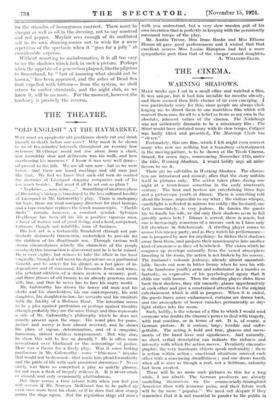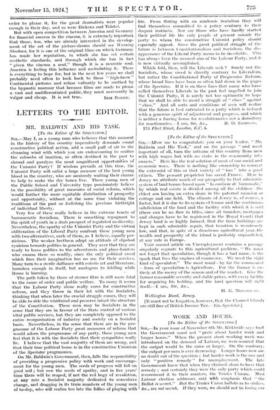THE CINEMA.
WARNING SHADOWS.
MANY weeks ago I sat in a small office and watched a film. It was unique, but it had lain invisible for months already, and there seemed then little chance of i s ever emerging. I was particularly sorry for this, since people are always chal- lenging me to direct them to one matchless film which will. convert them once for all to a belief as fierce as my own in the absolute, inherent values of the cinema. The ,Niebelungs was not sufficiently dramatic to be a missionary film ; The Street would have irritated many with its slow tempo, Caligari was badly titled and presented, The Marriage Circle too " clever."
Fortunately, this one film, which I felt might even convert many who now see nothing but a transitory entertainment, in the moving-picture, is to be shown at the Tivoli Cinema, Strand, for seven days, commencing November 17th, under the title, Warning Shadows. I would boldly urge all unbe- lievers to see it.
There are no- sub-titles in Warning Shadows. The charac- ters are introduced and named; after that the story unfolds. itself in pictures only. The action takes place during one, night at a town-house sometime in the early nineteenth century. The host and hostess are entertaining three fops and a picturesque youth at dinner. There is something odd about the house, impossible to say what ; the visitors whisper, candlelight is reflected in mirrors too coldly ; the husband, one feels immediately, is very jealous. He fancies the guests try to fondle his wife, or did only their shadows seem to fall greedily across lids ? Dinner is served, there is music, but one is increasingly conscious of a menace such as I have only felt elsewhere in Scheherazade. A strolling player comes to amuse this uneasy party, and as they watch his performance— one is prepared by now for anything—he filches their shadows. away from them, and projects their consciousness into another, kind of awareness as they sit bewitched. The vision which he conjures up develops naturally from the vexed atmosphere brooding in the room, the action is not broken by his sorcery. The husband's volcanic jealousy, already almost uncontrol- lable, bursts out now in bitter frenzy when he sees his wife in the handsome youth's arms and culminates in a murder so fantastic, so expressive of his psychological agony that it chills one with horror. Then the strolling player slides them back their shadows, they stir uneasily, glance apprehensively at each other and give a constrained attention to the original entertainment which is still in progress. When it is ended, the guests hurry away embarrassed, curtains are drawn back, and the atmosphere of horror vanishes permanently as day- light strikes into the room.
Such, baldly, is the scheme of a film to which I would send everyone who doubts the cinema's power to deal with tragedy, with real emotion, or in terms of -art. It is, of -course, a German picture. It is serious, large, terrible and unfor- gettable. The acting is bold and true, glances and move ments of the hand have real significance. And naturally. no short verbal description can indicate the richness and intensity with which the action moves. Peculiarly cinemato- graphic, the very inanimate objects speak undeniably ; there is action within action ; emotional situations succeed each other with a convincing dreadfulness ; and one draws breath when all is over as though a real, -not a fictitious, calamity had been averted.
There will be no more such pictures as this for -a long while, I am afraid. The German producers are already modelling themselves on the commercially-triumphant American films with immense pains, and their future work will be far more " popular." We need not despair if they remember that it is not essential to pander to the public in order to please it, for the great dramatists were popular enough in their day, and so. were Dickens and Tolstoi.
But with open competition between America and Germany for financial success in the cinema, it is extremely important that those, too, who are already interested in the develop- ment of the art of the picture-drama should see Warning Shadows, for it. is one of the original films on which Germany has. made her reputation, in which she has set certain aesthetic standards, and through which she has in fact " given the cinema a soul," though it is a neurotic soul. America is feeling this influence. and assimilating it. There is everything to hope for, but in the next few years we shall probably need often to look back to these " high-brow " Continental pictures and refuse valiantly to be soothed by the hypnotic murmur that because films are made to please a vast and undifferentiated public, they must necessarily be
vulgar and cheap. It is not true. Jars BARRY.











































 Previous page
Previous page